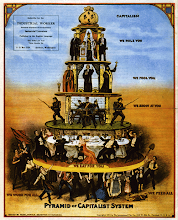A few posts ago I posted a quote from Daniel Little about the value of Marxist theoretics, and "connecting the dots" and I thought it was a generally a favorable view. Little however thought that Marx doesn't exactly give us enough empirically to go on for the present. And of course how could he when he was writing about 150 years ago. Radical economist David Ruccio takes exception to Little's verdict, and has a different take; it is interesting reading.
Eventually if I can ever find time, I would like to do a well thought out post critiquing the so-called "illegal immigration" debate we have in this country. So much of the real issues never makes it into mainstream discourse because mainstream liberals ignore them. One of the things that irks me is the assumption that undocumented workers are "taking" and not contributing. Of course from a Marxist perspective, if one knows what that is, this is absurd. By working here, immigrants are a tremendous source of easily exploited labor, and thus surplus value and profit. And their illegal status makes them that much more so. However, even from the perspective of taking the capitalist system for granted, the attack on immigrants, regardless of legal status, is counter productive and bad for the economy. Here's a post from a Tucson Citizen blog The Data Port on immigrant contributions to the Arizona economy. The orignal link from the Center for American progress is broken, but this quote is worth pasting at length:
The complex relationship of labor and consumption means that driving undocumented workers from the state would not “free up” more jobs for native Arizonans. Instead, it would have the same impact as driving out any other significant slice of the workforce. The report uses the town of Riverside, New Jersey, as an example.
After a construction boom in Riverside led to an influx of undocumented construction workers in the first half of the 2000s, the town adopted an ordinance in 2006 that imposed heavy fines on any businesses or landlords who hired or rented to undocumented immigrants. The ordinance was never enforced, but nonetheless had a big impact.
Feeling persecuted, 75% of Riverside’s immigrant population left, resulting in 45% of the town’s businesses being boarded up as they had been before the influx of immigrants. The legal cost of defending the ordinance in court also forced the town to delay infrastructure repairs and improvements. The ordinance was rescinded in 2007, but the damage had been done.




No comments:
Post a Comment